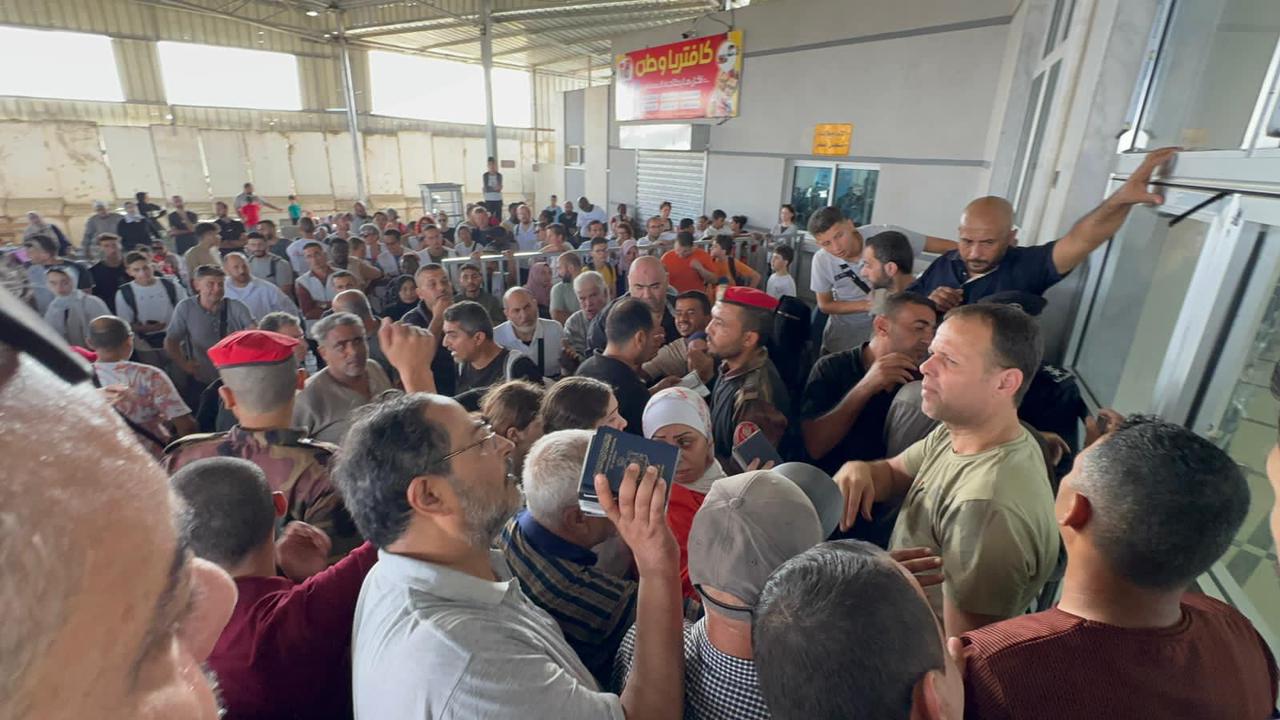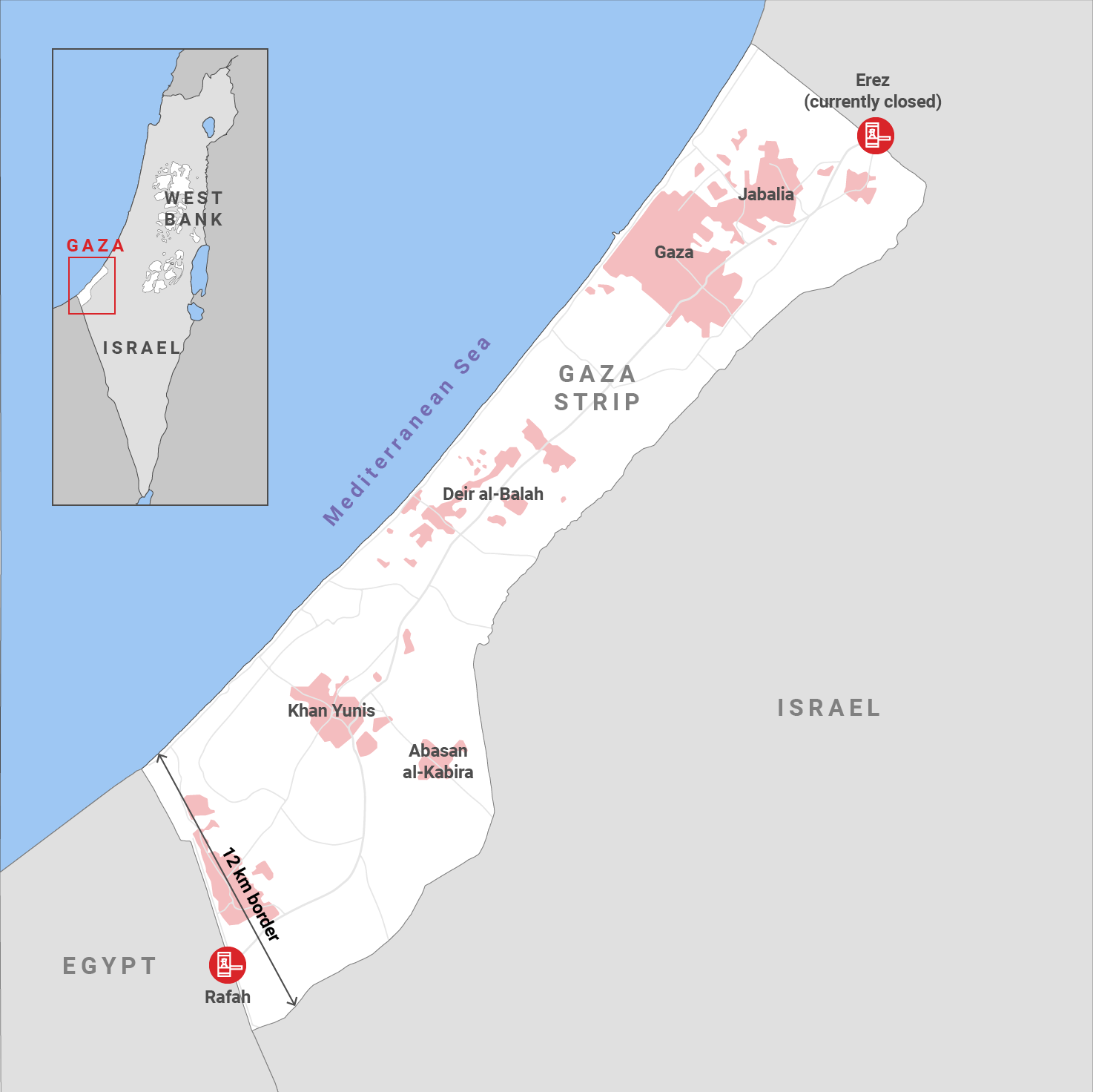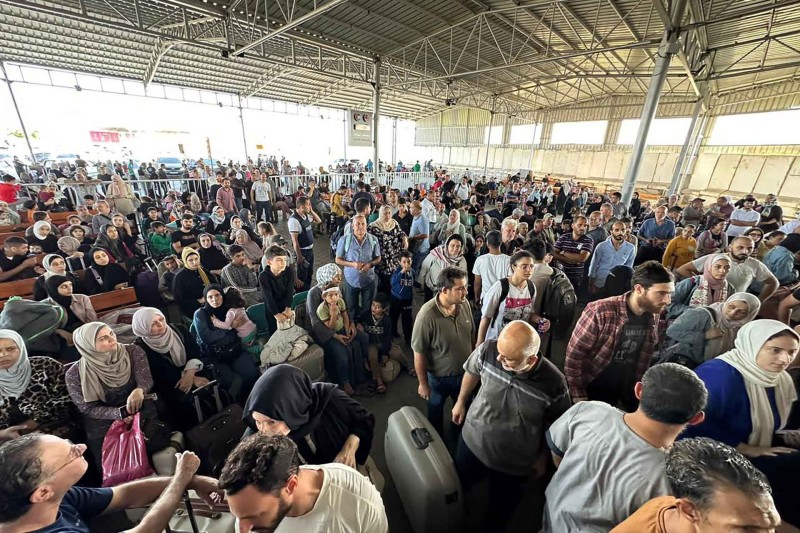Though her husband and three children are Palestinian, 31-year-old Rasha has Egyptian citizenship, which she hoped would help her family cross the tightly controlled Rafah border, Gaza’s only outlet since Israel laid siege to the coastal strip in October.
But she has not heard back about her repatriation request, which the family submitted through an online portal launched by Egyptian authorities in early December.
“We are dying in silence,” Rasha, who is struggling to feed and clothe her children in central Gaza, said through tears over the phone. “It is very cold in our nylon tent. We have no food … we live in constant fear and horror.”
There is a faster way to get through the Rafah border crossing. But that option is only available to those with thousands of dollars to spare.
For years, a network of Egypt and Gaza-based travel agents and fixers have offered fast-tracked passage through Rafah for a price, ranging from several hundred to several thousand dollars, depending in part on how frequently the border has been open for crossing.
The deeper the desperation to leave, the better the business. More than 100 days into the conflict, during which Gaza’s other Israeli-controlled exit has been shut, rates are soaring. While the prices fluctuate wildly, some brokers are now charging Palestinians between $4,500 and $10,000 to secure a crossing permit, according to more than a dozen interviews conducted by OCCRP and the Cairo-based SaheehMasr media platform. The rate for those with Egyptian nationality is lower, at around $650 to $1,200 per person.
Reporters spoke to 15 Palestinians and Egyptians who had reached out to brokers to ask about leaving. Two had successfully left the enclave by paying $4,500 each in fees, while three said they had been scammed by the agents and lost their cash. Others were desperately trying to raise money by selling their gold and other personal belongings, borrowing from friends and relatives, or through online crowdfunding.
Rasha said she was told it would cost a total of $40,000 to get her Palestinian husband and three children out through Rafah.
“No way we can afford that,” she said.
Some of these offers are openly advertised by travel agencies online, or shared in social media groups. Reporters who contacted the listed numbers were given quotes on the spot, such as an Egyptian agency that said it charged Palestinians $7,000, Egyptians $1,200, and other foreign passport holders $3,000 to exit.
Reporters were not able to determine exactly how these providers manage to arrange the crossings. But their ability to secure fast clearance from the Egyptian security services that control the border has long spurred allegations that a system of bribes is greasing the wheels.
“In 2022, we already collected testimonies about Egyptian officers extorting Palestinians to allow them to exit from Rafah,” Ahmed Benchemsi, the regional communications director for Human Rights Watch, told OCCRP.
“New reports of skyrocketing bribe rates for those desperate to leave are disheartening,” he said, condemning "Israel's willful starvation of Gaza" and "some Egyptian officers’ rapacious gatekeeping” of the border.
Egypt has denied any bribery or extortion is taking place. In a statement published on January 10, the head of Egypt’s state Information Service, Diaa Rashwan, rejected the “unfounded allegations” that additional fees are being imposed on Palestinians at the crossing.
The agency did not respond to OCCRP’s requests to comment.
A ‘Random and Unpredictable’ Border
Even before the war, the Rafah border could not be traversed freely.
Since 2007, it has been managed by Hamas’s Interior Ministry on one side and Egyptian security forces, including the General Intelligence Service, on the other. Israel also monitors the crossing from a nearby military base.
Prone to sporadic closures, the border has long been “perceived as random and unpredictable,” said Lorenzo Navone, a sociology lecturer at the University of Strasbourg. “Nobody could foresee when it would be open, who would be allowed to cross and [according to] which rule or criteria or principle.”
 The Rafah border crossing between Gaza and Egypt on November 1, 2023. (Photo: Yasser Qdeih)
The Rafah border crossing between Gaza and Egypt on November 1, 2023. (Photo: Yasser Qdeih)
From Gaza, the formal process required registering a request with the Hamas-run Interior Ministry. Approvals often took between two months in winter and six months in summer, while those traveling for medical purposes might see their applications processed faster, according to interviews with travelers.
But even securing a permit was no guarantee — Gazans could be turned back at the border by Egyptian authorities for various unforeseen reasons.
That’s where companies like Hala Consulting and Tourism, an Egyptian travel agency, stepped in. In 2019, the company started offering a VIP service referred to as “coordination,” or “tanseeq” in Arabic, to cross the Rafah border quickly and comfortably. For $1,200, the company would provide a permit within 48 hours, and a hassle-free trip from Gaza to Cairo, according to media reports at the time.
This was made possible through the use of a separate list of travelers approved by the Egyptian authorities, distinct from the registration process organized by Hamas.
This “two list” system explained why some applicants were able to receive approval more quickly than those who had registered months earlier, the UN’s humanitarian agency OCHA wrote in a 2018 report.
According to figures published on Facebook by Hamas’s border authorities, roughly one quarter of travelers in the two years prior to the war crossed the border through Egypt’s “coordination” list.
Since the war, this has been the only way out, said Wael Abu Omar, a spokesperson for the Hamas-run border authority. Around 200 Palestinians and Egyptians have been crossing Rafah in this manner daily, he said on January 11.
While there are a number of travel agencies and independent brokers active in the business, Hala is one of the most prominent. Gazans who posted online asking for services were often directed to the Egyptian firm, which lists offices in Cairo and in Rafah on its website, but also works with at least seven local agents in Gaza, according to its social media posts.
The company has powerful backers: it is owned by the prominent Egyptian businessman Ibrahim Al-Organi, who heads the Tarabin tribe in the Sinai desert bordering Israel and has other business partnerships with Egypt’s state.
Hala is one of eight companies operating under his Organi Group, which also includes a joint venture, Misr Sinai, with the Defense Ministry’s industrial conglomerate, the National Services Projects Organization (NSPO), Organi said in a 2014 interview with the Egyptian outlet Youm7.
In the interview, Organi said the NSPO owned 51 percent of the company’s shares, in partnership with two companies owned by the General Intelligence Service. OCCRP could not confirm whether there have been any changes in ownership in the years since.
“As you can see, all state entities are in this company. This gives us an advantage,” Organi said in the interview.
In 2016, Egypt’s president Abdel Fattah El-Sisi inaugurated the company’s new seven-factory complex for marble production.
The Organi Group and Hala did not respond to OCCRP’s requests to comment.
 The Rafah border sits on Gaza's southern frontier with Egypt. (Photo: Edin Pašović)
The Rafah border sits on Gaza's southern frontier with Egypt. (Photo: Edin Pašović)
Paying for a Permit
To see how the “coordination” process worked during wartime, reporters reached out to more than a dozen agencies and brokers.
The head of a Gaza-based travel agency, which was listed as one of Hala’s agents in a company Instagram post, told a reporter posing as a potential customer that he would need to pay $5,000 each for his Palestinian sister and mother to leave Gaza within seven days.
The formal process of registering through Hamas “stopped after the war,” the agent said on January 10.
“The Palestinian side has nothing to do with these permits anymore. It is purely an Egyptian intelligence operation,” he added.
In December, reporters contacted another broker based in Egypt, with no known affiliation to a travel agency. To prove his credentials, the broker texted a copy of his identity card, a receipt from a previous customer, and copies of Palestinian passports for which he had obtained exit permits.
“You pay half the price now through Vodafone cash” — an online payment method — “and the rest when you cross,” he wrote.
Asked if he could provide the names of people who left and their phone numbers, he responded: “Sister… after they cross, we destroy their application and all personal data for privacy. If these files fall into the hands of anybody it will be a problem, understood?”
Even severely injured Palestinians have to pay their way out, said Maher Mahmoud, a 23-year-old Palestinian who lives in Cairo and sells mobile phones.
“The brokers we talked to asked for $9,500 to take out my wife, and $7,000 each for my two nieces, Farah and Riham, who sustained serious injuries during the war and are bound to wheelchairs,” he told OCCRP.
His nieces were visiting relatives in Gaza when the war broke out, and lost their mother and other siblings, he said. Their father is in jail.
“The girls are now my responsibility. They have no one to care for them,” said Mahmoud. “But we are unable to pay these rates.”
Egyptians Unable to Go Home
While the Rafah border started opening in November to allow evacuations of foreign-passport holders and a select number of wounded Palestinians, many in Gaza’s Egyptian community feel abandoned by their government.
“I am Egyptian. My husband and children are all Egyptian. How can I be asked to pay money to enter my country,” a woman with the username Um Mohammad wrote on Facebook.
Since the war broke out, Hala has been charging Egyptians $650 for an exit permit, issued within a maximum of seven to 10 days, according to a company agent.
 Hala announced a service to facilitate travel through Rafah as part of Egypt’s “humanitarian efforts” in October 2023.“Only the ones who have money can pay and leave,” an Egyptian father of eight lamented from outside another Hala-affiliated agency in southern Gaza called Mushtaha for Travel and Tourism.
Hala announced a service to facilitate travel through Rafah as part of Egypt’s “humanitarian efforts” in October 2023.“Only the ones who have money can pay and leave,” an Egyptian father of eight lamented from outside another Hala-affiliated agency in southern Gaza called Mushtaha for Travel and Tourism.
The man, who requested anonymity in order not to risk his chances of leaving, told OCCRP the travel agent had asked for a total of $6,500 to take out his wife and eight children.
He said he had not heard back from the Egyptian Foreign Ministry since he applied for repatriation the official way a month earlier in the online portal.
“The portal they [Egyptian officials] keep referring to is just talk. Unlike foreign states, Arab countries don’t care about evacuating their nationals.”
The Egyptian Foreign Ministry declined OCCRP’s repeated request for comment.
Even those who have managed to scrounge up some of the necessary cash are not guaranteed an easy exit.
One of the journalists who worked on this story, a Palestinian living in London, paid a fixer $2,000 via a local money changer in November to try to evacuate her mother, who was visiting Gaza from the U.K. when the war broke out.
He later returned the money and told her that the “Egyptians are asking for up to $5,000 and I cannot ask you to pay that.”
“Prices are increasing by the day,” he said in a voice recording sent to the journalist, who requested anonymity in order not to jeopardize her mother’s journey. “Those who pay more cross. The Rafah crossing has turned into a black market and a place for mafias to operate. When the prices stabilize, I will get back to you with a quote to take her out.”
She is still waiting.






